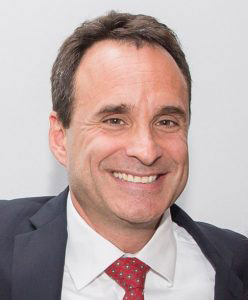Written by: Kendra Carter
Media contact: Beena Thannickal
 Bradley E. Bernstein, M.D., Ph.D., professor of pathology at Massachusetts General Hospital and Harvard Medical School and director of the Broad Institute’s Epigenomics Program, will present “Epigenetic Plasticity and the Hallmarks of Cancer” Friday, November 30 as the inaugural speaker of the UAB Comprehensive Cancer Center Grand Rounds.
Bradley E. Bernstein, M.D., Ph.D., professor of pathology at Massachusetts General Hospital and Harvard Medical School and director of the Broad Institute’s Epigenomics Program, will present “Epigenetic Plasticity and the Hallmarks of Cancer” Friday, November 30 as the inaugural speaker of the UAB Comprehensive Cancer Center Grand Rounds.
Bernstein’s lecture will begin at noon in the Margaret Cameron Spain Auditorium. Lunch will be provided.
“Dr. Bernstein is an internationally recognized expert in epigenetics in cancer. He has led this emerging field with a particular attention to clinically impactful discoveries,” said Michael J. Birrer, M.D., Ph.D., Evalina B. Spencer Chair in Oncology and director of the UAB Comprehensive Cancer Center.
The lecture is the first in the annual Cancer Center Grand Rounds, which will bring premiere cancer researchers from across the country to UAB. “The Cancer Center Grand Rounds series will connect UAB research with cutting edge technical and scientific discoveries in cancer. This will ensure our researchers are well informed and poised to help move the field forward,” Birrer said. “Further, this series will inform leaders in cancer research to the wonderful scientific environment at UAB.”
Bernstein is the Bernard and Mildred Kayden Research Institute Chair and Professor of Pathology at Massachusetts General Hospital, and a Broad Institute Member. Bernstein’s research focuses on epigenetics — changes in gene activity governed by influences outside the genes themselves – and specifically how modifications to the protein scaffold called chromatin contribute to mammalian development and human cancer. His work is notable for the identification of specialized chromatin structures that underlie stem cell pluripotency and aberrant epigenetic mechanisms that drive tumor initiation and drug resistance. He currently directs the Broad Institute’s Epigenomics Program, and is a leader of the NIH’s ENCODE project that aims to map all regulatory sequence elements in the human genome.
Bernstein received his B.S. from Yale University and his M.D. and Ph.D. from the University of Washington, before completing a residency in clinical pathology and postdoctoral research at Harvard University. Honors include an Early Career Scientist Award from the Howard Hughes Medical Institute, a Career Award in the Biomedical Sciences from the Burroughs Wellcome Fund, the NIH Director’s Pioneer Award, an American Cancer Society Professorship and the Paul Marks Prize for Cancer Research.